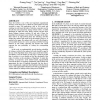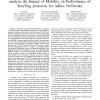1511 search results - page 118 / 303 » On the effectiveness of address-space randomization |
PLDI
2006
ACM
14 years 2 months ago
2006
ACM
Applications written in unsafe languages like C and C++ are vulnerable to memory errors such as buffer overflows, dangling pointers, and reads of uninitialized data. Such errors ...
SIGIR
2006
ACM
14 years 2 months ago
2006
ACM
Since the website is one of the most important organizational structures of the Web, how to effectively rank websites has been essential to many Web applications, such as Web sear...
INFOCOM
2003
IEEE
14 years 1 months ago
2003
IEEE
— A Mobile Ad hoc Network (MANET) is a collection of wireless mobile nodes forming a temporary network without using any existing infrastructure. Since not many MANETs are curren...
CCS
2010
ACM
13 years 9 months ago
2010
ACM
Securing wireless sensor networks against node capture is a challenging task. All well-known random key pre-distribution systems, including the Eschenauer and Gligor's pionee...
BMCBI
2007
13 years 8 months ago
2007
Background: The question of how a circle or line segment becomes covered when random arcs are marked off has arisen repeatedly in bioinformatics. The number of uncovered gaps is o...


